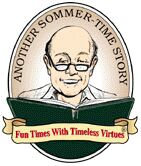|

Carl Sommer of Advance Publishing
 Carl
Sommer may be the only publisher who can truthfully claim to have taught
at every grade level in 27 different schools in all five boroughs of New
York City. The former Marine began teaching at the age of 40, entering
the publishing world later in life. His experience in the classroom and
as an assistant dean exposed him to the deficiencies of the educational
system. His first book, Schools in Crisis, is credited with
influencing school reform in many states. Mr. Sommer, now 70 years old,
founded Advance Publishing to produce children's books that impart
values and principles of success. The Houston-based company's offerings
include 18 titles in the "Another Sommer-Time Story" series for kids, as
well as an adult mathematics series and phonics program. For more
information, visit www.advancepublishing.com. Carl
Sommer may be the only publisher who can truthfully claim to have taught
at every grade level in 27 different schools in all five boroughs of New
York City. The former Marine began teaching at the age of 40, entering
the publishing world later in life. His experience in the classroom and
as an assistant dean exposed him to the deficiencies of the educational
system. His first book, Schools in Crisis, is credited with
influencing school reform in many states. Mr. Sommer, now 70 years old,
founded Advance Publishing to produce children's books that impart
values and principles of success. The Houston-based company's offerings
include 18 titles in the "Another Sommer-Time Story" series for kids, as
well as an adult mathematics series and phonics program. For more
information, visit www.advancepublishing.com.
TL: How is Advance Publishing different from other children's
publishers?
My goal as a publisher is to teach children values that will lead to
successful lives. There is a prevalent philosophy among some leading
educators to allow children to "discover their own values." I believe
this is a formula for disaster. Educators should teach children positive
values; then, when they are mature, let them choose the values they deem
best for themselves. Our motto states: "We Believe in Fun! We Believe in
Kids! We Believe in Training!"
TL: You're not just a publisher. You've also written 18
children's titles. Adult books that carry a "message" are often
criticized for being preachy. How subtle do you think an author needs to
be in teaching values with a children's story?
I avoid being preachy, at all costs. We get reports from children that
one of the reasons they like our books is because they teach. As one
child expressed it, "They have a point to them."
One needs to be extremely subtle in writing children's books that teach
values. One crucial element is to have an interesting storyline. I can't
stress this enough: Children's books must be exciting and fun. Then with
that captivating storyline, weave in the values you wish to use to help
children.
TL: How do you choose your illustrators and what kind of
direction do you give them?
 As
the author, I offer suggestions on what I would like to have on every
page. The artists make rough sketches, then we go over the drawings and
offer suggestions or approval. After the rough sketches, they make
better line drawings. After final approval, they draw the colored pages. As
the author, I offer suggestions on what I would like to have on every
page. The artists make rough sketches, then we go over the drawings and
offer suggestions or approval. After the rough sketches, they make
better line drawings. After final approval, they draw the colored pages.
TL: What do you do after you receive the drawings?
One of the amazing innovations in illustration is the computer. We scan
the finished drawing into the computer, and alter anything we don't
like. Any imperfections from the artist we can correct. We can also take
a head and enlarge it or shrink it, add animals, or color objects
differently. Sometimes, we have the artist draw an object we want and
paste it into the picture.
TL: Most publishers stick to a 32-page format for children's
books. Why do you prefer 48 pages?
If you have an interesting story line, a 48-page book is not too long.
I've read these books many times, and it is a joy to see the children
glued to the book and the story. By the way, most of Dr. Seuss' books
are 64 pages.
TL: What is your favorite "Sommer-Time" story and why?
Time Remote is my favorite book because it has such a powerful
storyline in that it teaches how to avoid living a life of failure.
Christopher is like so many children. He desires to eat what he wants
and just play. He gets his wishes, and the story shows in a dramatic way
what happens to those who follow that permissive lifestyle.
TL: One of your most popular books is Can You Help Me Find
My Smile? Tell us about it.
The bear cub Teddy lost his smile, and he tried many ways to find it.
He finally found it by helping others. Out of this story, we are
developing a "Smile Contest" for schools where children from
kindergarten through sixth grade will participate. The kindergarten
children will draw a picture about how they have helped someone find
their smile, and the other children will write an essay.
Today's philosophy on crime is to catch the criminals and throw away
the key. But prevention is better than intervention. How much wiser it
is to teach children values to keep themselves out of trouble. We hope
to promote this contest in schools throughout America. What a revolution
would occur if all the schools spent two weeks teaching children that
happiness comes by helping others.
--Interview by Kimberly Hundley |